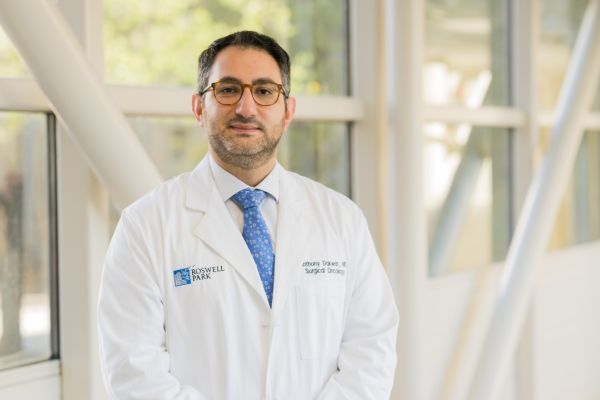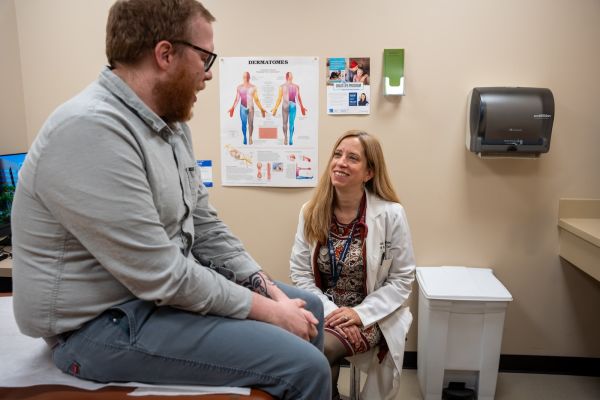Yes, it often can be!
Metastatic colorectal cancer means that cancer cells have spread beyond their organ of origin, the colon or rectum, to other organs, most commonly the liver and lungs. Historically, patients with metastatic disease were frequently deemed incurable and were only treated with ongoing chemotherapy. Many new approaches have changed this paradigm and offer patients better options and curative treatments.
For this reason, if you have been diagnosed with colorectal metastases and you’ve been told that more chemotherapy is your only option, a second opinion at Roswell Park Comprehensive Cancer Center may provide alternatives.
One in four people with colorectal cancer will have metastatic disease at the time of their initial diagnosis, says Benjamin Calvo, MD, FACS, formerly a Surgical Oncologist at Roswell Park. Also importantly, half of those patients who don’t have metastases initially will eventually develop them. However, treating the metastases — especially those in the liver or lungs — can make an impact on survival and offer a potential cure.
Colorectal cancer most commonly travels to the liver (25%-30%) and the lungs (17%) and thus we have developed many ways of treating these. How quickly the cancer spreads is also key. "For example, when a metastasis is found two years after the initial colorectal cancer operation, that shows the metastases grew rather slowly improving the likelihood that we can treat the new tumor with various techniques including surgery,” Dr. Calvo says.
Surgery is a critical approach for metastatic disease
Performing an operation to remove the metastases from the liver and /or the lungs remains a key part of therapy. Highly specialized liver surgeons and thoracic surgeons work closely with colorectal surgeons and medical oncologists to choose the best treatment plan for each individual patient. All of these experts work together at Roswell Park every day in what is called a multidisciplinary team.
“Even for metastases, nothing beats cutting the tumor out with good margins, meaning there is no sign of cancer in the remaining tissue surrounding the tumor and there is enough healthy liver tissue to re-grow,” explains Dr. Calvo. Some cases require open surgery, but Roswell Park surgeons are often able to use minimally invasive laparoscopic or robotic surgery technology, providing a faster recovery and less pain.
When large portions of the liver need to be cut out, a technique called portal vein embolization can be used before the operation to induce the healthy liver tissue to grow larger, which makes the surgery to remove the tumors safer.
For lung metastases, thoracic surgeons may opt for video-assisted thoracoscopic or robotic surgery. This minimally invasive surgical approach removes metastases to the lungs through two to four small incisions and surgical tools assisted by three-dimensional video guidance. Roswell Park is a high-volume center for this highly specialized surgery.
You have time for a second opinion
Even if you were not diagnosed or treated at Roswell Park initially, we can arrange for a consultation with our specialized team.
Other treatments for colorectal metastases
Roswell Park offers a number of other options to treat colorectal metastases that can extend survival or offer cure. These include:
- Hepatic artery infusion. Also known as "liver pump or HAI pump" therapy. This advanced approach delivers higher doses of chemotherapy directly to the liver only, reducing side effects to other organs in the body. Surgeons implant a small, wireless pump under the skin of the abdomen, which delivers a continuous supply of chemotherapy directly to the liver.
- Heat ablation therapy. A small probe is inserted directly into the metastatic tumor through the skin and emits energy in the form of microwaves that heat the tissue, killing cancer cells.
- Radioembolization or Selective Internal Radiation Therapy. This treatment places tiny radioactive spheres or beads into the artery that supplies blood to the liver tumor. The beads both block the blood flow that feeds the tumors and deliver radiation directly into the tumors.
- Stereotactic body radiation therapy. This option delivers highly precise radiation therapy in fewer but more intense doses to the tumor sites.
- Targeted systemic therapy and immunotherapy. Roswell Park analyzes the tumors for specific proteins and gene characteristics that mean the tumors can be treated with these different classes of drugs. These new agents can often be taken in pill form.
All these options require a multidisciplinary team of experts only available at centers like Roswell Park, Dr. Calvo says. “We hold weekly conferences here, and the idea is to discuss and pick the best available technology for a specific patient’s metastases. All the oncology specialists meet to discuss all the available therapies, so every patient gets the best personalized care.”



